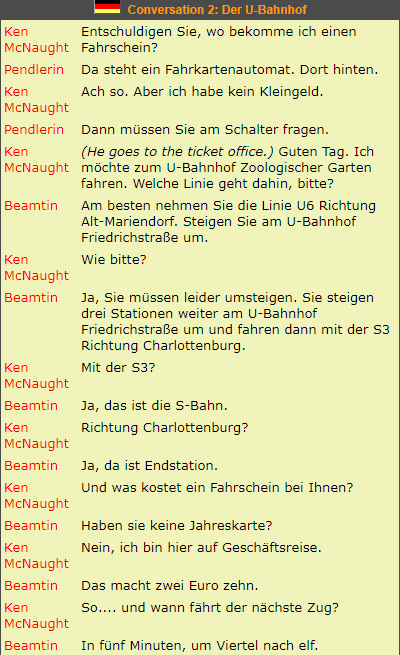
wo bekomme ich...?---"wher can I get...?" Note that there is no word for "can" in the German version.
der Fahrschein---This means "the ticket". You might also see two alternative words for "ticket" - "die Fahrkarte" or "der Fahrausweis".
der Pendler---This is a male "commuter". A female commuter is "die Pendlerin".
der Fahrkartenautomat---"Ticket machine". See the picture below. All underground stations in Berlin have automatic ticket machines. You simply choose the type of ticket you require and insert your money. Click here to see a screenshot of the instructions on the front of a German ticket machine.
dort hinten---"Over there at the back". "Hinten" means "at the back", whilst "vorne" means "at the front".
ach so---Oh, I see
das Kleingeld---This means "change" - literally "little money". Ken McNaught has no change for the ticket machine, so has to ask at the counter.
dann müssen Sie... "Then you'll have to...." The verb "müssen" is an irregular verb (see subsequent sections).
am Schalter---This means "at the counter". "Der Schalter" is a masculine noun.
zum...fahren---He wants to travel to Zoo Station. The verb "fahren" is used when you use a means of transport; "gehen" is used for going somewher on foot.
die Linie---the (train, bus) line
welche Linie geht dahin?---"Which line goes there?". The "-e" ending on "welche" is added because "die Linie" is a feminine noun.
die Beamtin---"The ticket clerk (female)". This word is also used to translate a "civil servant".
am besten nehmen Sie...---your best bet would be to take...
Richtung Alt-Mariendorf---This means "in the direction of Alt-Mariendorf". "Die Richtung" is the German word for "direction".
am U-Bahnhof "At the underground station". Note that "an" is the preposition used here and that "an + dem" are contracted to form the single word "am".
steigen Sie ... um---This means "to change (bus, train, tram)". Here it is two words with the separable prefix going to the end of the clause, wheras the infinitive "umsteigen" is written as only one word. An explanation of German separable verbs is given on Page 6 of this chapter.
drei Stationen weiter---"Three stations onwards". Both "der Bahnhof" and "die Station" can be used to translate "underground station".
U6---die U-Bahn is the conventional abbreviation for "der Untergrund" (= the Underground).
S3---die S-Bahn is the normal abbreviation for "die S-Bahn (Schnellbahn)", which might best be translated as "suburban railway" (see the picture of two old-fashioned S-Bahn trains at the bottom of this page).
da ist Endstation---that's the last stop
die Jahreskarte---"A yearly (travel) pass". This is the cheapest way to travel round Berlin and most major German cities.
ich bin hier auf Geschäftsreise---We've had this before. It means "I'm here on business". Remember?
Wann fährt der nächste Zug?---"When does the next train depart?" "Wann?" is the question word used when you want to ask the precise physical time of something.
um Viertel nach elf---at a quarter past eleven
 英语
英语 日语
日语 韩语
韩语 法语
法语 西班牙语
西班牙语 意大利语
意大利语 阿拉伯语
阿拉伯语 葡萄牙语
葡萄牙语 越南语
越南语 俄语
俄语 芬兰语
芬兰语 泰语
泰语 丹麦语
丹麦语 对外汉语
对外汉语

